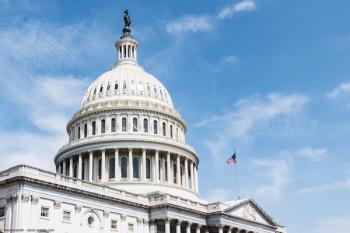
- Vol. 47 No. 4
- Volume 47
- Issue 4
AUA lobbies Congress on PCa, prior auth
Members of the urology community who participated in the Annual Urology Advocacy Summit in Washington early last month urged lawmakers to support initiatives to improve patient care, including in minority populations, increase support for urologic research, and ease regulatory burdens.
Members of the urology community who participated in the Annual Urology Advocacy Summit in Washington early last month urged lawmakers to support initiatives to improve patient care, including in minority populations, increase support for urologic research, and ease regulatory burdens.
More than 200 members of the urology community participated in the Summit, which included educational sessions on advocacy topics such as work force issues, urologic care for veterans, and other critical access-to-care concerns.
Attendees participated in meetings with lawmakers from 112 House districts and 74 Senate offices and discussed three primary concerns: prostate cancer screening in high-risk populations, increased funding for urologic research, and the regulatory burden of prior authorization and its impact on urologic practices and patients.
“The AUA Summit confronts and obliterates the myth that physicians can’t make a difference in Washington. It offers an opportunity for urologists to use their intelligence, problem-solving skills, insight, and passion for patient care to shape and redirect health care legislation and regulations in our and our patients’ favor,” said Thomas Rechtschaffen, MD, chair of the AUA’s Legislative Affairs Committee.
“During our meeting this year, we discovered new avenues to access research funds and rollbacks on harmful regulations. We were a loud voice, added to other physician groups, to rally against prior authorization burdens. Congress is hearing us and paying attention. We obtained support to direct funding to research how prostate cancer affects people of color more specifically and for renewal of PCORI [Patient-Centered Outcomes Research Institute] legislation, which is another source of research funding that our academic urologists and trainees depend upon.
A call for more research on PCa in African-Americans
Lawmakers were urged to encourage the National Cancer Institute to direct additional research efforts toward better understanding prostate cancer among African-American men and other populations at high risk for the disease.
The AUA pointed out that in 2018, after being pressed for years by the urologic community, the U.S. Preventive Services Task Force (USPSTF) released upgraded recommendations for prostate cancer screening but was unable to make specific recommendations for African-American men, citing a lack of available research evidence of the benefits to these patients.
Also by Bob Gatty:
The USPSTF has called for additional studies “to explore the optimal screening frequency and whether beginning screening before age 55 years provides additional benefits to African-American men.” The AUA’s clinical practice guidelines on early detection of prostate cancer support this statement, the association said in a briefing paper provided to members of Congress.
Summit attendees urged Congress to support increased funding in fiscal year 2020 for the Department of Defense Congressionally Directed Medical Research Programs, which since 1992 has funded 16,350 research grants and projects totaling $11.6 billion.
In FY 2019, prostate cancer research in the program received $100 million and kidney cancer research received $20 million, and since FY 2016, Congress has provided bladder cancer funding through the program as well.
The AUA also urged lawmakers to support pending legislation to reauthorize the PCORI to avoid a lapse in its research efforts. Created in 2010 by the Affordable Care Act, the Institute is an independent, non-profit research agency that facilitates comparative clinical effectiveness research to help patients make informed decisions about their care.
Since 2017, the Institute has invested nearly $2.4 billion in more than 600 research-related projects, including more than $32 million for nine different urologic disease research initiatives. Congressional authorization for the program expires in 2019 unless the program is extended.
In addition, the AUA joined with the Ad Hoc Group for Medical Research Funding in requesting that Congress provide $41.6 billion for the National Institutes of Health, a 6.4% increase over current funding.
“NIH funding has already improved the lives of Americans with urologic diseases, including those with [BPH],” the AUA said in its congressional briefing paper.
In addition, the AUA said, NIH research has shed light on potential health care savings with better treatment options for urinary incontinence, which costs more than $7.5 billion annually to evaluate and treat.
Next:
Summit attendees encouraged members of Congress to support the introduction of bipartisan legislation to address prior authorization issues and include consensus recommendations by the AUA and other leading national physician organizations.
The AUA noted that on Feb. 5, the American Medical Association released the results of a survey indicating more than one-quarter of physicians said the prior authorization process has led to serious or life-threatening events for their patients.
Read:
The AUA and more than 100 other health care organizations have endorsed the “AMA Prior Authorization and Utilization Management Principles,” intended to “ensure that patients receive timely and medically necessary care and medications and reduce the administrative burdens.”
The AUA also has joined with the Regulatory Relief Coalition, which includes specialty provider organizations, in working with key lawmakers to address the issues physician organizations and patients face because of prior authorization.
Articles in this issue
almost 7 years ago
Why you should resist the urge to sell in a down marketalmost 7 years ago
Failure to consult urologist at heart of casealmost 7 years ago
Who should own medical records-the doctor or patient?Newsletter
Stay current with the latest urology news and practice-changing insights — sign up now for the essential updates every urologist needs.






